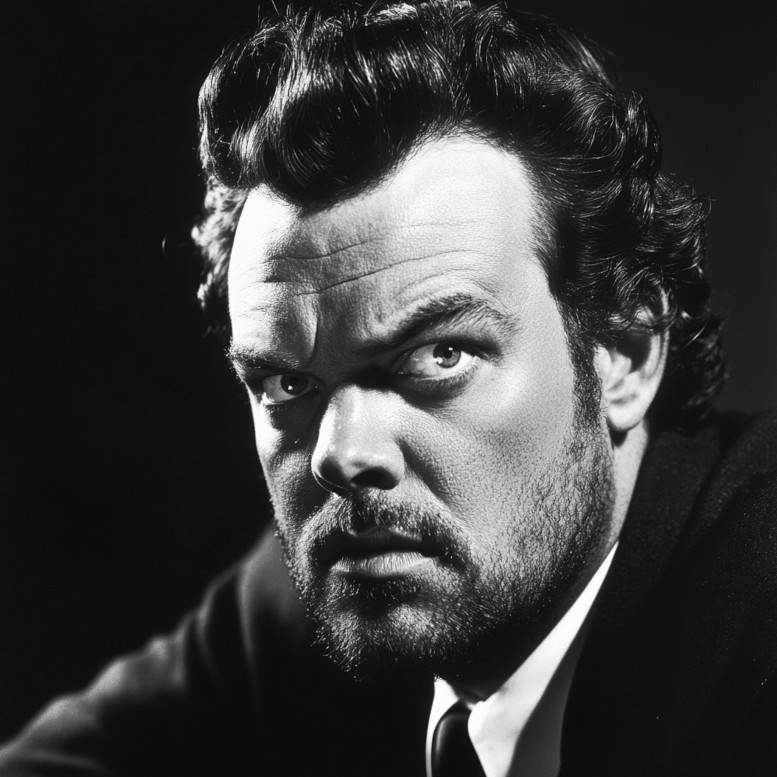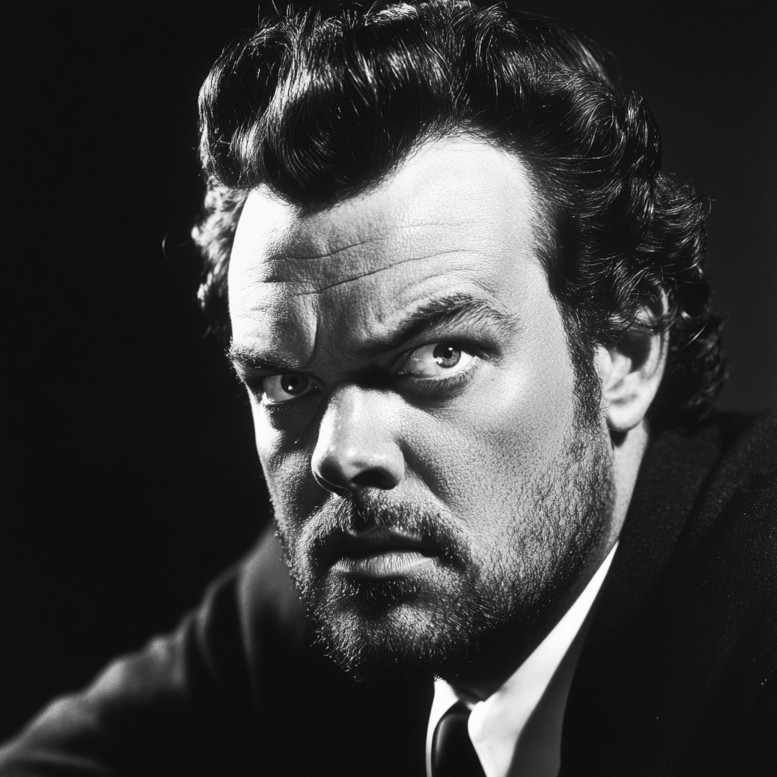


Orson Welles (1915–1985) was an American actor, director, writer, and producer who is widely regarded as one of the most innovative and influential filmmakers in the history of cinema. Welles is best known for his groundbreaking film Citizen Kane (1941), which he co-wrote, directed, produced, and starred in. The film is frequently cited as one of the greatest movies ever made, particularly for its innovative use of narrative structure, cinematography, and sound. Welles' career spanned radio, theater, and film, and he left an indelible mark on each medium with his visionary approach to storytelling and his willingness to challenge the conventions of the time.
Early Life and Education
Birth and Family Background: George Orson Welles was born on May 6, 1915, in Kenosha, Wisconsin, to a wealthy and artistic family. His father, Richard Head Welles, was an inventor and businessman, and his mother, Beatrice Ives Welles, was a concert pianist and suffragette. Welles was a child prodigy, showing an early talent for the arts, particularly in music and painting. His parents divorced when he was young, and his mother died when he was nine, followed by his father's death when he was 15. After becoming an orphan, Welles was placed under the guardianship of Dr. Maurice Bernstein, a family friend.
Education and Early Interest in Theater: Welles attended the Todd School for Boys in Woodstock, Illinois, where he was encouraged to pursue his artistic interests by headmaster Roger Hill. It was at Todd that Welles began experimenting with theater, writing, directing, and acting in his own productions. His early experiences at Todd laid the groundwork for his future career in theater and film.
Early Career and the Mercury Theatre
Radio Work and "The War of the Worlds": Welles gained national fame with his work in radio during the 1930s. In 1938, at the age of 23, he directed and narrated a radio adaptation of H.G. Wells' The War of the Worlds for the CBS Radio series The Mercury Theatre on the Air. The broadcast, which was presented in the form of a news report, caused widespread panic among listeners who believed that an actual Martian invasion was taking place. The incident made Welles a household name and demonstrated his mastery of the medium, as well as his ability to create compelling, realistic drama.
Theater: The Mercury Theatre: Welles co-founded the Mercury Theatre in 1937 with producer John Houseman. The Mercury Theatre quickly became known for its innovative and dynamic productions, many of which were adaptations of classic plays. Welles' production of Shakespeare's Julius Caesar, set in a contemporary fascist state, was particularly acclaimed and showcased his ability to reinterpret classic works in bold new ways.
Hollywood and Citizen Kane
Arrival in Hollywood: Welles' success in radio and theater attracted the attention of Hollywood, and in 1939 he was offered an unprecedented contract by RKO Pictures, giving him complete creative control over his films. This deal allowed Welles to make Citizen Kane, his first feature film, which he began working on in 1940.
Citizen Kane (1941): Citizen Kane is often hailed as one of the greatest films ever made, and it revolutionized the art of filmmaking. The film tells the story of Charles Foster Kane, a wealthy and powerful newspaper magnate whose life is explored through a series of flashbacks as a reporter tries to uncover the meaning of Kane's dying word, "Rosebud." The character of Kane was widely believed to be based on the real-life publishing tycoon William Randolph Hearst, who tried to suppress the film's release.
Welles' innovative use of deep focus cinematography, low-angle shots, non-linear narrative structure, and complex sound design were groundbreaking at the time and influenced generations of filmmakers. Welles himself starred in the title role, delivering a performance that showcased his range as an actor. Citizen Kane was nominated for nine Academy Awards and won the Oscar for Best Original Screenplay. Despite its critical acclaim, the film was not a box office success upon its initial release, but its reputation grew over time, and it is now considered a landmark in the history of cinema.
Later Film Career and Challenges
The Magnificent Ambersons (1942): Welles' second film, The Magnificent Ambersons, was an adaptation of Booth Tarkington's Pulitzer Prize-winning novel. The film was another ambitious project that demonstrated Welles' mastery of visual storytelling. However, the film was taken out of Welles' hands by RKO, which drastically re-edited it and added a new ending without his approval. The studio's interference resulted in a truncated version of the film that was released to mixed reviews, though it has since been recognized as a flawed masterpiece.
Hollywood Struggles: After The Magnificent Ambersons, Welles' relationship with Hollywood studios became increasingly fraught. His next major project, It's All True, was a documentary about Latin America that was never completed due to studio conflicts and budget issues. Welles found it difficult to secure funding and creative freedom for his projects, leading him to work sporadically in Hollywood and take on acting roles in other directors' films to finance his own work.
The Third Man (1949): One of Welles' most famous acting roles came in Carol Reed's The Third Man, where he played the enigmatic and morally ambiguous Harry Lime. Welles' performance, particularly his delivery of the famous "cuckoo clock" speech, is one of the highlights of the film, which is considered a classic of post-war cinema.
Othello (1951) and European Work: Frustrated by Hollywood, Welles spent much of the 1950s and 1960s working in Europe, where he found more creative freedom. He directed and starred in an adaptation of Shakespeare's Othello, which won the Palme d'Or at the Cannes Film Festival in 1952. Welles continued to explore Shakespeare with his film Chimes at Midnight (1965), which is regarded as one of the finest adaptations of the Bard's work.
Later Life and Legacy
Final Films and Projects: Welles continued to make films throughout his later years, often on a shoestring budget and with little support from Hollywood studios. Some of his notable later works include Touch of Evil (1958), a noir thriller in which Welles both directed and starred, and The Trial (1962), an adaptation of Franz Kafka's novel. Both films were critically acclaimed, but like much of Welles' work, they struggled to find commercial success.
Unfinished Projects: Welles left behind several unfinished projects, including The Other Side of the Wind, a film that was finally completed and released posthumously in 2018. Welles' ambitious and often financially troubled productions were a reflection of his relentless drive to push the boundaries of cinema, even at great personal and professional cost.
Death: Orson Welles died of a heart attack on October 10, 1985, at the age of 70. At the time of his death, Welles was working on several projects, continuing his lifelong dedication to the art of filmmaking.
Legacy: Orson Welles' legacy as a filmmaker, actor, and cultural icon is immense. His innovations in narrative structure, cinematography, and sound design have had a lasting impact on the art of cinema. Citizen Kane remains a cornerstone of film studies and is frequently cited as one of the greatest films ever made. Welles' work has inspired countless directors, including Martin Scorsese, Steven Spielberg, and Francis Ford Coppola.
Beyond his technical contributions, Welles is remembered for his bold, uncompromising vision and his willingness to challenge the conventions of Hollywood. He was a true auteur, whose work transcended the limitations of the commercial film industry and left an indelible mark on the history of cinema.
Orson Welles was a visionary artist whose work continues to influence and inspire filmmakers, critics, and audiences around the world. His commitment to pushing the boundaries of storytelling and his refusal to compromise on his artistic vision made him one of the most important figures in the history of cinema. Despite the challenges he faced throughout his career, Welles' films remain some of the most studied and revered in the history of film, and his legacy as a pioneer of modern filmmaking is firmly established.

We use cookies
We use cookies and other tracking technologies to improve your browsing experience on our website, to show you personalized content and targeted ads, to analyze our website traffic, and to understand where our visitors are coming from. Privacy Policy.